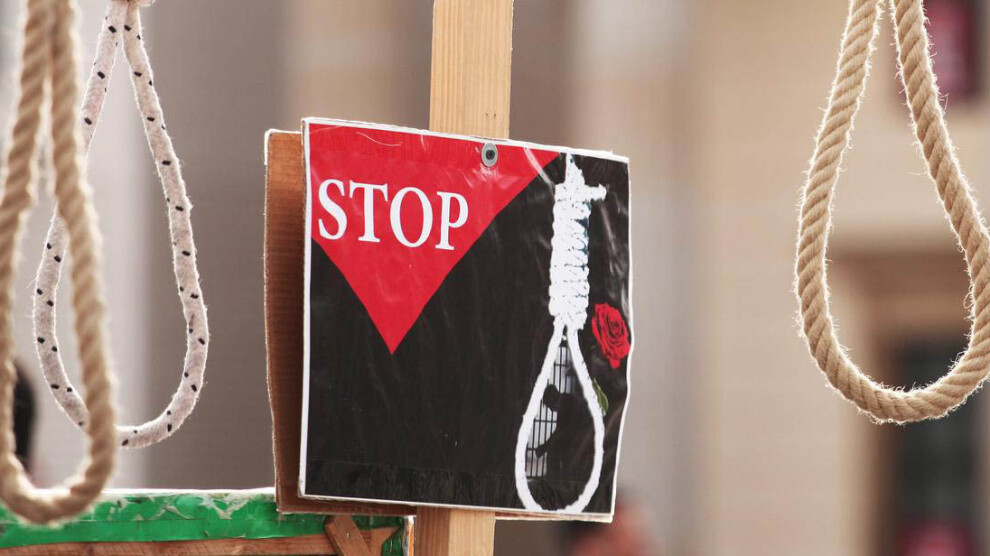Unable to crush protests, Iranian regime turns to executions
The Iranian regime has so far sentenced more than 30 protestors to death and executed two of them over the protests in East Kurdistan and Iran. 26 more protestors face death sentence.
The Iranian regime has so far sentenced more than 30 protestors to death and executed two of them over the protests in East Kurdistan and Iran. 26 more protestors face death sentence.

Since 16 September, when the mass anti-government protests began in East Kurdistan and Iran against the murder of Kurdish woman Jina Mahsa Amini, nearly 19 thousand protestors have been detained and hundreds of citizens have been arrested by the Iranian regime. The whereabouts of myriad protestors is still unknown.
The Iranian regime is using the death penalty to intimidate and suppress the protesters. More than 30 protestors have been sentenced to death so far. Protestors Mohsen Shekari and Majid Reza Rehneverdi have already been executed.
Those sentenced to death are accused of 'killing state forces, enmity against God, spreading corruption, armed rebellion against the state and insulting the prophet'.
26 PROTESTORS LIKELY TO BE EXECUTED
According to Amnesty International's report on the executions, 26 protestors arrested during the protests could be executed soon.
The names of 6 protestors from East Kurdistan who may face the death penalty are as follows: Ferzad and Ferhad Tahazade, Karwan Sahi Pervane, Reza Islam Dost, Hejar Hamid and Shahram Mehrud Mela.
According to the information obtained, a court issued a death sentence for these six Kurdish prisoners in their absence. It also remains unknown where they were transferred from the Urmiye Prison. Uncertainty about their condition caused suspicion that they would be executed.
Three rap singers named Saman Yasin, Tomac Salihi and Behram Ali Kendi are among those sentenced to death.
Saman Yasin, from Kirmaşan, is accused of 'waging war against God and spreading corruption'.
Protests that took place during Hedis Cebafi's 40th mourning day in Kerec in January resulted in the death penalties for protesters. Hamid Qerehesenli, Muhammed Mehdi Keremi, Said Muhammed Heseni, Hüseyin Muhammed and Reza Ariya, who were detained following the protests, are accused of "killing Rulaha Ecem, a member of the pro-government paramilitary Basij forces disguised among protestors".
THREE WOMEN SENTENCED TO DEATH
Furthermore, three women named Mesha Muhamed, Fehime Kerim and Farzane Qerehawslu are among those sentenced to death.
Mesha Mohammed is accused of insulting the prophet. Fehime Kerimi, who was arrested in Pakistan, is a volleyball coach. Hamid Qerehesnli and his wife, Farzane Qerehesenli, both health workers, are accused of helping to kill a Basij member disguised in Kerec.
Two activists, Milan Armun and Nestu Nikxa, face the death penalty for allegedly killing a Basij member in the Ikbatan region.
3 SOCCER PLAYERS SENTENCED TO DEATH
Three soccer players, Emir Nasir Azadani, Said Yaqub and Salih Mir Haiim, have been sentenced to death for allegedly killing a police officer and two detainees in Isfahan.
The names of the individuals sentenced to death are as follows: Sehend Nurmiheme Zade, Mahan Sedaret Mern, Menuçher Mehman Newaz, Muhammed Berxun, Muhammed Qubadlu, Ebulfazil Mehrî Hüseyin Haci, Muhsin Rezazzadei Qeraqlu, Said Şirazi and Ekber Xefari.
CRIMES LEADING TO DEATH PENALTY
Waging war against God and spreading corruption were adapted into Iran's judicial system in 1982 and was later recognized as a criminal act in the Islamic Penal Code in 1990.
Other crimes in Iranian Islamic law include "using weapons to intimidate the people, armed rebellion against the state, planning to overthrow the state, and armed robbery". Those who commit these crimes are subjected to the death penalty, amputation or deportation according to the Iranian criminal law. These penalties are given according to the judge's discretion.
According to Article 286 of the Iranian Penal Code, adopted in 2011, crimes of spreading corruption are considered within the scope of "crimes that concern the public security of the country, disrupting security, harming people, public and private property".
Crimes against the internal and external security of the country, administering bribes, disrupting the functioning of the country, disrupting the economic system of the country, burning by arson, destroying, distributing poisonous and dangerous substances and selling weapons are defined as examples of crimes of spreading corruption.
Armed rebellion against the authorities is also considered a crime. The Iranian regime claims that the activists who take up arms against the state should be sentenced to death, and those who do not use weapons should be sentenced to prison.
According to article 262 of the Iranian penal code, if a person insults the prophet of Islam or other prophets, she/he is sentenced to death. However, if the person is drunk or the meaning of his/her words cannot be determined, the death penalty will not be given.